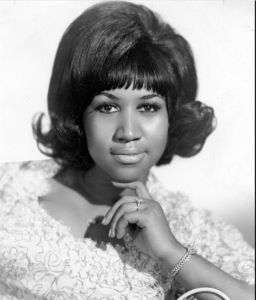What does excellence look like?
I saw it when I attended the rehearsal for a presidential inaugural gala. Watching Aretha Franklin consider everything from the sound, the lighting, down to where she needed to stand on stage. She was exacting and collaborative. When she ran through a song she had sung a thousand times before, the passion shone from the beginning, middle, to the end. It sounded the way I remembered it as three generations of my family listened to her on the radio during the summers spent at my grandmother’s house.
Throughout her 61-year career, Franklin made it look easy. However, excellence is often expected, and, over time, taken for granted because we’re used to seeing the result. Excellence doesn’t just happen. It’s the work Franklin did behind the scenes where her excellence was born, tested, and refined. There is much we can learn and apply in business by exploring her excellence.

Aretha Franklin. Photo Credit: Wikipedia
Observing the best in their fields. Her mother, Barbara Siggers Franklin, was an accomplished piano player and vocalist, and her father, Rev. C.L. Franklin, a minister. Their interests laid the foundation on which Franklin, who learned to play the piano by ear at the age of 10, built her career.[1] She also observed the top musicians such as gospel singers Mahalia Jackson, Clara Ward, and Rev. James Cleveland; jazz pianists and composers Oscar Peterson and Duke Ellington who visited her family home.[2] Her exposure to different genres, singing styles, and compositions was a wonderful training ground for experimentation.
Growing up with friends like Smokey Robinson and Diana Ross, Franklin and her friends benefited from the exchange of ideas, the support and the encouragement of each other as they developed their unique musical styles. As a result, each of them reached the pinnacle of their careers with number one hits, global success, and musical awards.
In business, having a community that supports each other, sharpens their talents, and pushes each to rise to the occasion is critical to helping companies, as well as an industry, develop. The challenge for companies today is to make sure you’re finding your clients that will value your services or products. That requires understanding your customer at a deeper level. Franklin understood her audience and delivered. She knew which type of music would appeal to a specific generation and which wouldn’t.[3] Continued experimentation and knowing when to pivot is critical because vibrancy and creativity are what can keep an industry on its toes.

Aretha Franklin. Photo Credit: Pianohelp.net
Knowing when to pivot contributed to her longevity. Franklin had multiple pivots throughout her career. She signed her first contract for a gospel album at age 14. By age 18, she left gospel music to sing secular music and signed with Columbia Records. By 25, she was crowned the “Queen of Soul.”
That same year, Franklin signed with Atlantic Records to achieve her goal of commercial hits, not just awards. The years 1967 through 1979 are considered the prime of her career, with hits like “Natural Woman,” “Chain of Fools,” and the release of the best-selling gospel album, “Amazing Grace,” in 1971 selling 2 million albums.[4]
The music scene, starting in 1973, through the 1980s, changed from R&B to Disco and Rock. Her music mentor left the company by the end of 1975 and her last top 40 hit was Something He Can Feel,” in 1976.[5] She found a way into those spaces to remain relevant. She moved to Arista in 1980 where she had a hit album “Jump to It.” Part of her strategy throughout the rest of her career required partnering with younger artists such as George Michael, Lauren Hill, and John Legend. The key was finding the right artist to marry her skills with to expand her audience. In other cases, it’s thinking out of the box and branching into acting. Franklin appeared in hit the hit movie “The Blues Brothers,” one of seven she appeared in overall, which expanded her audience.
Often when companies have been successful, we don’t necessarily think the revenue will end. We’re focused on digging deeper into the space we occupy and finding new ways to optimize the revenue, the technology, and the experience. For a time that strategy works, and then it doesn’t. When it doesn’t, we’re worried about how we’re going to survive because the investment made in the infrastructure and skills have become obstacles to change. Companies wanting to thrive must be willing to pivot because embracing new trends and finding new markets and customers are what will separate you from competitors. That requires experimenting and building a risk capability muscle. Part of Franklin’s foundation for being able to pivot was her willingness to continuously learn.

The Radio City Music Hall at night. New York City.
Continuous Learner. Can you imagine you’ve had 40 plus years of career success, won numerous awards, and now you’re back in school learning the basics of classical piano? Franklin did just that by studying piano at Juilliard.[6] She did it again, when she started her label Aretha Records. It allowed her to write and produce her own compositions. [7] It also meant learning the business side and how to distribute her music over the internet.
Continuous learning is critical to longevity. Embracing insights from new ideas and experiences are what stimulates creativity, new solutions, and may require new business models. It’s what helps determine which issues matter and which to avoid as you navigate your way through disruptions. Franklin used her knowledge of different music genres, a deep knowledge of music listeners of different generations, and experiences – what to keep and what to shape in the music – as she covered the songs of the Beatles, such as “The Long and Winding Road.[8] It’s also what allowed her to become a part of new communities.
She embraced citizenship at multiple levels. As a music industry leader, Franklin viewed mentorship as a two-way street. Mentored by those that came before her, she was mentored by contemporaries such as James Brown, who taught her to make sure received her payment for performing before she performed. And, she mentored younger singers such as John Legend and Jennifer Hudson on career management.
Her citizenship transcended generations and interests outside of music. Dr. Martin Luther King was a frequent visitor at her father’s home when he was in Detroit. Her father and his church backed the Civil Rights Movement. Franklin supported the civil rights movement by singing at events, including his funeral. Forty years later, Franklin sang at President Obama’s Inauguration. She extended her interests to understanding economics by reading Alan Greenspan’s book, “The Age of Turbulence” or asking friend, Michael Eric Dyson, about topics such as archaeology and politics.[9],[10] Franklin’s support included local charities, churches, and organizations in Detroit by giving her time, money, and services, as well as international charities such as the Elton John Aids Foundation.
Giving back to the industry, individuals, a movement, or a charity, is about finding something greater than yourself to believe and support. Millennials and Gen Z are increasing expecting businesses to be citizens of the local, national, or international community and engage in corporate social responsibility. No longer is it just the pay or the benefits. Where a company stands on an issue or engages in a community may very much dictate whether they are willing to work for a company.

New York City, United States – September 3, 2014: Aretha Franklin paving slab in front of famous Apollo Theatre in Harlem New York City
Excellence is often easy to spot. As Harvey Mason Jr., a producer who had worked with Franklin on several albums noted, “I went into all my sessions with Aretha trying to see if I could make the best singer in the world sound even better.”[11]
The strategy and work necessary to achieve it and maintain it is a lifetime of work. It requires a willingness to know what you don’t know and find people and ways to fill the gaps that will raise you to a higher level of success and life well lived.
Aretha Franklin leaves a wealth of knowledge, experiences, and success for us to learn from.
Rest in peace Ms. Franklin and thank you for the journey of a lifetime.
[1] Aretha Franklin, Wikipedia.
[2] Ibid.
[3] Beckerman, Jim, “Aretha Franklin Talks to The Record: Archive,” The Bergan Record, August 17, 2018.
[4] Ad ibid.
[5] Kahn, Ashley, “Jerry Wexler: The Man Who Invented Rhythm & Blues,” Rolling Stone, August 15, 2008.
[6] Remnick, Dave, “Soul Survivor: The Revival and Hidden Treasure of Aretha Franklin,” The New Yorker, April 4, 2016.
[7] Pareles, John, “The Queen of Soul Takes Control,” The New York Times, November 4, 2007.
[8] Sheffield, Rob, “Why Nobody Sang the Beatles Like Aretha,” Rolling Stone, August 16, 2018.
[9] Pareles, John, “The Queen of Soul Takes Control,” The New York Times, November 4, 2007.
[10] King, Noel and Ana Lucia Murillo,“The Voice of the Century: Michael Eric Dyson Looks Back on Aretha Franklin’s Life,” NPR, August 17, 2018.
[11] Hinds, Julie, “Aretha Franklin Biopic: ‘Aretha was Adamant That it Be Jennifer (Hudson)’ Playing Her,” The Detroit Free Press, August 17, 2018.
Aretha Franklin featured photo: Photo Credit: Tej Bharat.






You must be logged in to post a comment.